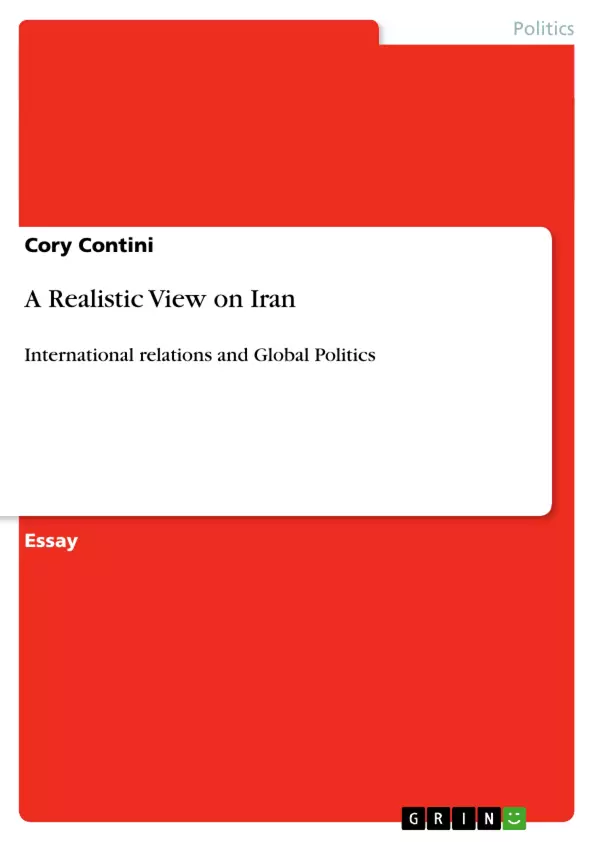Globalization is the most commonly used word to describe the increasing interconnectedness between nations. In this modern era, it is almost impossible not to be affected by a global issue in some way or another. For example, the strengthening of airport security and the increased scrutiny was felt by all air travellers after the attacks of 9/11. There are many different theories that scholars adhere to in order to make sense of these issues such as liberalism, Marxism, or constructivism but "realism has been the dominant theory of world politics since the beginning of academic International Relations" (Baylis & Smith, 2008, p.95) which falls under the positivist umbrella.
To test the validity and applicability of realism, this paper will analyze Iran's nuclear program through the lens of a realist to understand why there has been so much tension surrounding their nuclear advancements. Of course, there are many different variations of realism but for the purpose of this paper, a `unified realism' will be used which is explained more in detail later. Ultimately, if realism can reasonably identify and mutually relate some of the key concepts that are found in this global issue, then it will be considered a success.
Much like realism, Iran's nuclear program has a long and distinct history. The Wikipedia page alone regarding Iran's nuclear history is over 50 pages long with no less than 400 citations; it is quite extensive to say the least. The history extends back to the 1950s after a U.S. governmentaided coup d'etat forced the democraticallyelected Prime Minister Mohammed Mossadegh out of office, bringing Shah Mohammad Reza Pahlavi to power (Deluce, 2003). With the help and protection of the United States, Shah Mohammad Reza Pahlavi's ran a dictatorshipmonarchy with strong allegiance to the Americans. The Peace for Atoms program initiated by former U.S. President Dwight Eisenhower is what helped Iran actually construct their first nuclear facility in 1967 but it would not have been possible without the overthrown government. Iran then signed and ratified the Nuclear NonProliferation Treaty (NPT), thus becoming subject to verification by the International Atomic Energy Agency (IAEA).
Inhaltsverzeichnis (Table of Contents)
- Globalization and Realism
- Iran's Nuclear Program: A Historical Overview
- Realism and its Core Elements: Statism, Survival, and Self-Help
- The Security Dilemma and Collective Security
- Iran's Nuclear Advancement and the Security Dilemma
- Realism and the Iranian Nuclear Program: A Concluding Perspective
Zielsetzung und Themenschwerpunkte (Objectives and Key Themes)
This paper aims to analyze Iran's nuclear program through the lens of realism, exploring the tensions surrounding Iran's nuclear advancements. It utilizes a 'unified realism' approach to examine the dynamics of power and security in international relations, particularly in relation to Iran's nuclear ambitions.
- Realism as a framework for understanding international relations
- The historical context and development of Iran's nuclear program
- The concept of the security dilemma in relation to Iran's nuclear advancements
- The role of power and survival in shaping international relations
- The application of realist principles to the Iranian nuclear case
Zusammenfassung der Kapitel (Chapter Summaries)
The first chapter explores the concept of globalization and its impact on international relations, introducing realism as a dominant theory within the field. Chapter two provides a historical overview of Iran's nuclear program, tracing its development from the 1950s to the present. Chapter three delves into the core elements of realism, including statism, survival, and self-help, explaining their relevance in understanding international relations. Chapter four examines the security dilemma and collective security, highlighting the challenges posed by states' pursuit of security in an anarchic international system. Chapter five focuses on Iran's nuclear advancement and its implications for the security dilemma, analyzing the international community's reactions and concerns.
Schlüsselwörter (Keywords)
This paper explores key concepts such as realism, international relations, nuclear proliferation, Iran, security dilemma, statism, survival, self-help, collective security, and the Westphalian system. It examines the complexities of power, security, and the international system, focusing on the interplay of these factors in relation to Iran's nuclear program.
Frequently Asked Questions
How does the theory of realism explain Iran's nuclear program?
Realism views the program through the lens of state survival and power, where Iran seeks nuclear advancement to ensure its security in an anarchic system.
What is the "security dilemma" in this context?
It describes how Iran's efforts to increase its own security (through nuclear tech) lead other states to feel less secure, prompting counter-measures and tension.
What are the core elements of realism discussed?
The paper focuses on statism (the state as main actor), survival, and self-help as the primary drivers of international politics.
When did Iran's nuclear history begin?
It dates back to the 1950s and 60s, initiated with the help of the United States through the "Atoms for Peace" program under the Shah.
What role did Mohammed Mossadegh play in Iranian history?
He was the democratically elected Prime Minister who was overthrown in a 1953 coup, which shifted Iranian-Western relations significantly.
- Arbeit zitieren
- Cory Contini (Autor:in), 2010, A Realistic View on Iran, München, GRIN Verlag, https://www.grin.com/document/230612



